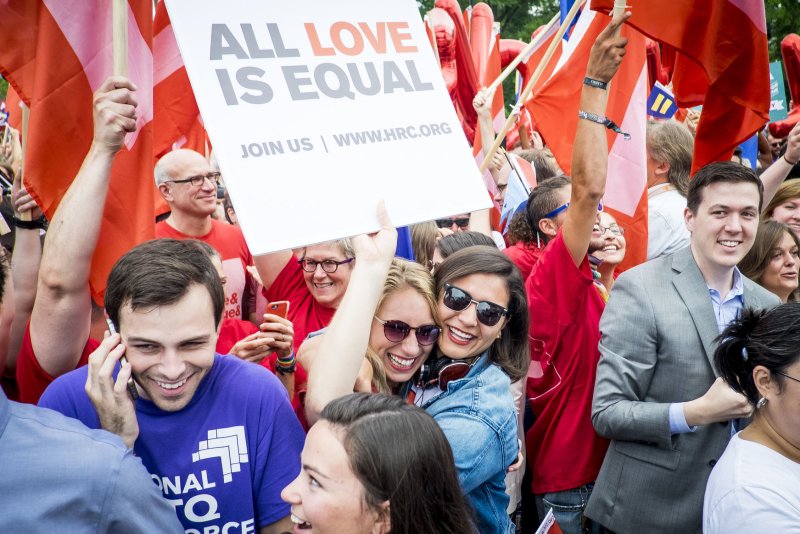1 of 14 | Same sex marriage proponents celebrate in front of the United States Supreme Court in Washington, D.C., on June 26, 2015, after the Court's 5-4 ruling was announced that legalizes the ability for same-sex couples to marry nationwide. The 5-4 ruling had Justice Anthony Kennedy writing for the majority. President Barack Obama said during a press conference after the ruling was announced that "This ruling is a victory for America."Same sex marriage proponents celebrate in front of the United States Supreme Court in Washington, D.C., on June 26, 2015, after the Court's 5-4 ruling was announced that legalizes the ability for same-sex couples to marry nationwide. The 5-4 ruling had Justice Anthony Kennedy writing for the majority. President Barack Obama said during a press conference after the ruling was announced that "This ruling is a victory for America. Photo by Pete Marovich/UPI |
License Photo
WASHINGTON, June 23 (UPI) -- The Supreme Court ruled Friday that states are constitutionally compelled to issue marriage licenses to same-sex couples, legalizing gay marriage nationwide.
The court ruled in a 5-4 decision with Justices Anthony Kennedy, Ruth Bader Ginsburg, Stephen Breyer, Sonia Sotomayor and Justice Elena Kagan voting in the majority.
"The challenged laws burden the liberty of same-sex couples, and they abridge central precepts of equality. The marriage laws at issue are in essence unequal: Same-sex couples are denied benefits afforded opposite-sex couples and are barred from exercising a fundamental right," the court wrote in the majority opinion. "Especially against a long history of disapproval of their relationships, this denial works a grave and continuing harm, serving to disrespect and subordinate gays and lesbians."
"The right to marry is a fundamental right inherent in the liberty of the person, and under the Due Process and Equal Protection Clauses of the Fourteenth Amendment couples of the same-sex may not be deprived of that right and that liberty," the court added. "Same-sex couples may exercise the fundamental right to marry."
President Barack Obama called the ruling "a victory for America."
"Today we can say, in no uncertain terms, that we have made our union a little more perfect," he said, speaking from the Rose Garden at the White House.
"We are a big, vast and diverse nation," Obama said. "But bound by our shared ideal that no matter who you are, or what you look like, how you started off, or how and who you love, America's a place where you can write your own destiny."
He said Friday's ruling is a reminder of "the belief that ordinary people can do extraordinary things."
Chief Justice John Roberts and Justices Antonin Scalia, Samuel Alito and Clarence Thomas dissented.
In his dissent, Scalia again takes issue with the court becoming involved in "this practice of constitutional revision." He also took issue with the way the court's opinion was written, and, as he did in Thursday's dissent on the Affordable Care Act decision, he used some fiery language of his own.
"What really astounds is the hubris reflected in today's judicial Putsch," Scalia wrote, later adding, "The opinion is couched in a style that is as pretentious as its content is egotistic.
"The stuff contained in today's opinion has to diminish this court's reputation for clear thinking and sober analysis," he said.
In their ruling, the justices had to determine whether the Fourteenth Amendment extended to same-sex couples.
Section 1 of the Fourteenth Amendment in the Constitution of the United States states:
"All persons born or naturalized in the United States... are citizens of the United States and of the state wherein they reside. No state shall make or enforce any law which shall abridge the privileges or immunities of citizens of the United States; nor shall any state deprive any person of life, liberty, or property, without due process of law; nor deny to any person within its jurisdiction the equal protection of the laws."
Justices had to determine if the amendment requires states to license marriages for same-sex couples and if the amendment requires states to recognize marriages between same-sex couples who were married lawfully in another state.
The states that have current constitutional or statutory bans on same-sex marriage are Texas, Nebraska, North Dakota, South Dakota, Louisiana, Mississippi, Georgia, Arkansas, Tennessee, Missouri, Kentucky, Ohio and Michigan.
More than 40 lawyers worked for same-sex couples from Ohio, Kentucky, Michigan and Tennessee in cases that were consolidated from six to one, Obergefell v. Hodges, which was taken for the Supreme Court's consideration.
The case centers around Jim Obergefell, 48, of Cincinnati, Ohio. Obergefell and John Arthur began dating in 1993.
Arthur was diagnosed with ALS, also known as Lou Gehrig's Disease, in 2011 -- two years before the Supreme Court allowed the federal government to recognize same-sex marriage in states that allowed it.
In 2013, Obergefell and Arthur married on the tarmac of a Baltimore, Md., airport because Ohio did not recognize same-sex marriage. The couple filed a lawsuit against Ohio to have their marriage formally recognized on Arthur's death certificate.
Arthur died three months after their wedding.
A federal judge ruled in favor of Obergefell and Arthur, but Ohio appealed and won, which took the case to the Supreme Court.
Obergefell addressed a crowd that gathered outside the Supreme Court building after the ruling.
"Today's ruling from the Supreme Court affirms what millions across this country already know to be true in our hearts: Our love is equal," he said. 'That the four words etched onto the front of the Supreme Court -- "Equal justice under law" -- apply to us too."















